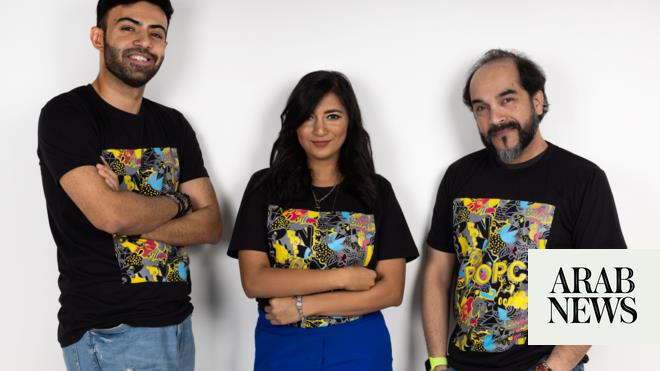
The National Library of Israel has a collection of more than 2,500 rare Islamic books and manuscripts
Islam and Middle East Collection to be digitized and made available free online over the next three years
LONDON: Many are too fragile to be placed on permanent display, some are priceless and all currently languish unseen in the vaults of the National Library of Israel (NLI) on the Givat Ram campus of the Hebrew University of Jerusalem.
But over the next three years the library’s remarkable collection of more than 2,500 rare Islamic books and manuscripts, some dating back as far as the ninth century, will be digitized and made available free online as part of an outreach program seeking to build cultural bridges in one of the world’s historically most divided regions.
For Dr. Raquel Ukeles, curator of the Islam and Middle East Collection at the library, the initiative “reflects the library’s renewal program, as we move from being this closed academic library to becoming a real national library, among the national libraries of the world. We want to share our collections with the global community, and to enable easy free use.”
That is “true for all our collections,” she added. But there is a special motive for opening up access to the library’s Islamic treasures.
“We have a world-class Islamic collection and, for me, that’s not so bizarre because the National Library in Jerusalem sits at the cradle of the great monotheistic traditions, including Islam.”
In Israel today, Ukeles said, “there are almost a million-and-a-half Muslim citizens and this is their library as well. Also, we are in the Middle East and so it should be very natural for us to be focusing on and investing in this material, to create space for Muslim culture in Israel and in the broader intellectual life, whether it’s in the Middle East or in the world, to enable greater understanding.”
The project has been made possible by funding from Arcadia, a UK-based charitable fund that helps charities and scholarly institutions to preserve cultural heritage, and which has awarded more than $678 million in grants to projects around the world since 2002.
One of Arcadia’s key aims is the promotion of open access to information.
Anthea Case, principal adviser to the Arcadia board whose members include Neil MacGregor, former director of the British Museum and the UK’s National Gallery, said that the fund “helps fulfil the great promise of the Internet — knowledge without borders or barriers.”
She added: “By making freely available materials that celebrate the diversity of human achievement, libraries can play an important role in overcoming fear, division and oversimplified narratives.”
This is an especially pressing issue in Israel, where, according to Ukeles, “there is a tremendous amount of ignorance about Islam, about Palestinian culture and Arab culture generally that has real repercussions on the political level. I see it as the role of libraries and all institutions that are developers and protectors of culture to enter into that space.”
The library is “an apolitical institution, of course, and we need to be in order for everyone to feel comfortable. But you look around and you see what happens when people aren’t able to see each other as human beings with histories and cultures and religions,” she said.
It may seem a bold stance for an institution at the heart of the Israeli establishment — and next year the library is due to move into a new landmark building situated between the Israel Museum and the Knesset, Israel’s parliament.
But the library has its roots in an earlier vision of Zionism, different to the one that found final expression in the establishment of the state of Israel in May 1948.
The earliest version of the library was founded in 1892 by a group of Jewish intellectuals, who, according to Ukeles, were “humanists, philosophers, great scholars, and many of them were Arabists — not just Arabic students, but were themselves native Arabic speakers.”
They represent “a time that unfortunately has become hard to imagine today — a time when Arabic-speaking Jewish scholars, even religious Jewish scholars, swam in the world of Arab-Islamic culture and civilization,” she said.
For them, it “wasn’t a contradiction at all, but the most natural thing in the world that this library they were building would have a phenomenal Arabic collection,” she added.
In fact, the library’s ambitious program to digitize and open up to the world core elements of its Islam and Middle East collection, recognized by scholars as one of the top research collections of its kind in the Middle East, honors the legacy of a Middle Eastern Jew who fought in vain to persuade the founders of modern Israel to create a state based on an equal partnership between Jews and Arabs.
Abraham Shalom Yahuda was born in Jerusalem in 1877 to a wealthy Jewish family whose roots were in Europe and Iraq. His father, Benjamin, was from Baghdad. The family of his mother, Rebecca Bergman, hailed from Frankfurt in Germany on her father’s side, and from Iraq on her mother’s.
By the time they settled in Jerusalem, the family was in the business of buying and selling collectible books and manuscripts. Arabic was the language spoken at home and Yahuda, described as “a bright and precocious student,” immersed himself in the culture of his forebears, studying literary Arabic alongside European languages and traditional Jewish studies.
In 1893, at the age of just 16, he wrote his first academic work, a paper on pre-Islamic Arab history and culture, which was published in Hebrew.
It was followed in 1895 by a translation of classical Arabic poetry, in the year Yahuda left for Europe to study semitic languages and Middle Eastern culture and history in Darmstadt, Frankfurt am Main, Nuremberg, Heidelberg and Strasbourg. His doctorate, completed in 1904, was on Bahya ibn Paquda, an 11th-century Jewish mystic in the Islamic world, who wrote in Arabic.
Yahuda’s “greatest scholarly contribution,” said Ukeles, “was to open up this Islamic world of which these Jewish scholars and thinkers were writing and to return these great masterpieces to their Islamic context.”
But Yahuda had two more great contributions to make to the preservation of Islamic heritage.
In Europe he had studied under Ignaz Goldziher, a Hungarian scholar of Jewish descent regarded as one of the founders of modern Islamic studies in Europe.
In 1924, following Goldziher’s death in 1921, his former student helped to acquire the 6,000 volumes of the scholar’s private collection for what was then the Jewish National Library, laying the foundation stone of the NLI’s Islamic collection.
Yahuda’s vision, as he later wrote, was that “such a library as this, which contains a lovely and amazing treasure of the best of Arabic literature and the finest works of Islam, may indeed become a meeting place for Arab and Jewish scholars alike.”
There, he imagined, “they may sit as brothers in wisdom and friends in scholarship, and the inspiration of enlightenment will impart upon our neighbors, those closest to us both genealogically and in mindset, the same spirit of tolerance, of munificence, kindheartedness, and generosity in which the Arabs excelled in ancient times, during their rule of East and West and during the most sublime generations of their intellectual achievement and culture.”
--------
KNOWLEDGE WITHOUT BARRIERS
Among the more than 2,500 books and manuscripts that will go online over the next three years are a number of “gorgeous” Qur’an copies that date back as far as the ninth century, said Dr. Raquel Ukeles.
“It’s very moving and thrilling to sit with a Qur’an manuscript from over a thousand years ago,” she said. Thanks to Yahuda’s encyclopaedic approach to collecting, “we can trace the development of how the Qur’an was written down. It was, of course, the first fully written Arabic book in history and so the history of Arabic writing is reflected in the history of the Qur’an.”
She added: “Coming into contact with this extraordinary historic material is a tremendous honor. Every time I have an opportunity to share it with others, I do, and digitally we will be able to share it with everyone.”
The other treasures that will go online include a 10th-century miniature Qur’an, which measures 37 mm by 68 mm. Complete with a cloth case and pewter box, it was carried into battle by an Ottoman warrior at the siege of Vienna in 1529 and captured by the Austrians. Another is a section of a well-preserved mid-10th century Qur’an from North Africa that features gold filigree designs and “is breathtaking and a remarkable piece of history,” according to Ukeles.
Yahuda specialized in collecting the manuscripts of great scholars that were copied in or near their lifetimes. Among them are “Three Epistles of Ahmad Ibn Taymiyya” — thoughts on prayer times, divine and human love and the creation of the world written by the 14th-century Muslim scholar and theologian who inspired the Wahhabism movement. This manuscript, a copy of the original made by Taymiyya’s follower Ibn Muhibb Al-Samit after his leader’s death in prison in Damascus in 1328, is one of the few that can already be studied online in detail at www.nli.org.il
Other manuscripts to be digitized include “The Niche of Lights” (Mishkat Al-Anwar) by Abu Hamid Al-Ghazali, a mystical interpretation of the Qur’an chapter Al-Nur (The Light) dated 1115, four years after the author’s death; an 11th-century copy of philosophical treatise “The Book of Healing” (Kitab Al-Shifa) by Ibn Sina; and “The Comprehensive Book of Islamic Jurisprudence” (Jam’ Al-Jawami fe uṣul Al-Fiqh) completed by Taj Al-Din Al-Subki in 1359 and copied by his student Khalil b. Al-Ṣafadi in 1360.
--------
In his lifetime Yahuda became one of the most important collectors of Islamic manuscripts of the early 20th century and, before his own death in 1951, he bequeathed his entire collection to what by then had become the Jewish National and University Library, and which in 2007 was renamed the National Library of Israel.
Yahuda, said Ukeles, was a Zionist, but his vision of Zionism differed greatly from that of the leadership.
At the first Zionist Congress, held in Basel, Switzerland, in 1897, the 20-year-old Yahuda approached Theodor Herzl, the Austro-Hungarian founder of the movement regarded by Israel today as “the spiritual father of the Jewish State.”
According to Yahuda’s memoirs, said Ukeles, “he tried to explain to him that they needed to take seriously the needs and aims of the native Arab population in the land of Israel, but Herzl dismissed him.”
Undeterred, “Yahuda tried again and again to convince Herzl and Chaim Weizmann (Israel’s future first president) that if they didn’t take this issue more seriously, it would lead to endless strife between Arabs and Jews.”
Almost 70 years on from Yahuda’s death, the NLI’s project to open up an Islamic collection that owes so much to him is an acknowledgment of his dream of a more equitable future for Palestine.
“I definitely hear Yahuda in the background,” said Ukeles. “We are coming full circle and I think he would be very pleased to know what was happening to his collection.
“We are a library and so our interest is that people use our material. But we also have a broader role to play as a central cultural institution to encourage people to go beyond their own culture and history to understand others.”












